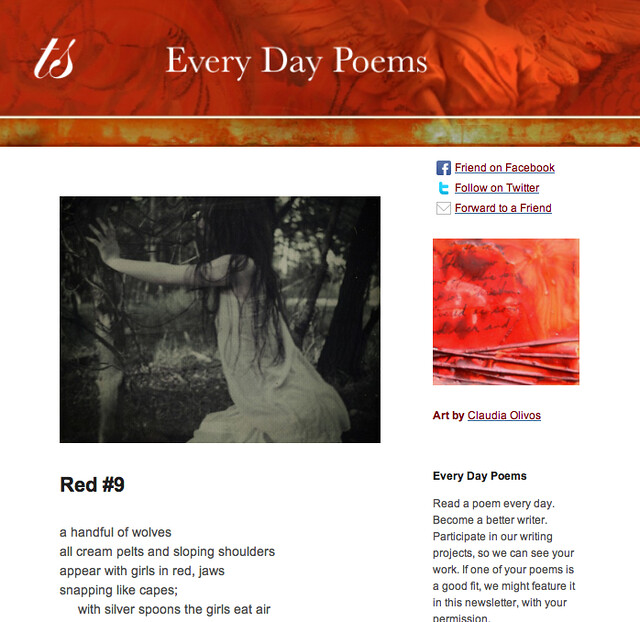I began reading poetry because I could never finish novels. I’m not sure this is how many people come to poetry, but it was my route. In high school, I only read a handful of the assigned novels (a mistake I deeply regret now as an adult!) but I read every single poem. When I got to the end of a poem I felt like I had accomplished something, been invited into something—I felt like I’d been given a key.
I liked poetry at that point in my life, but I didn’t love it.
I began writing poetry because I wanted to impress a girl—maybe this is how most young men come to poetry. I really wanted to date her. Poetry—something she liked—seemed a good way to break the ice. I wrote her a terrible poem (I hope to this day she hasn’t kept it!) and slipped it into her locker. She read it and loved it; we dated a while.
Still, I liked poetry at that point in my life, but I didn’t love it.
I was in college when I began taking poetry seriously—I imagine this is where most people get serious about poetry, if they get serious about it at all or haven’t already. I realized it wasn’t a means to an end—not to make myself feel better about being slower than everyone else, not to help me round the bases. I was taking a writing class for an extracurricular requirement, but I was excited to be there. We we’re sent home with a pack of poems to read for the next class.
Dead center in the packet was William Stafford’s “Traveling Through the Dark”—a brilliant poem about the author’s experience finding a dead deer on a narrow road and getting out to move the animal for the good of the order. He soon sees there’s more to the situation—that the doe is pregnant and her fawn is still alive inside her. He then makes a tough decision—a decision the echoes through the wilderness all around him.
That’s when it happened—that’s when my like modulated to something else.
My reaction to this poem was bizarrely physical—nothing like it had ever happened to me while I was reading. As I read the poem’s title I got up to get an apple from the kitchen. By the time I came back to the couch—apple in hand—the deer’s secret had been revealed. My breath got a bit short, my neck tensed—I’m not sure why. I felt like I had been punched—the moral imperative, the cruel grief of an accident. All of it made me have to sit down in order to finish. By the end of the poem I was dumbfounded—speechless and still. I sat for quite a while—it was all I could do.
For such a short poem, it’s incredibly varied and complex—the worlds within worlds; the narrowing of the natural world leading to the realization of life, then the broadening of the natural world as it moves outward again; the still, small peaceful sensibility of intention; and the ethical question at the pith: is it ever right to kill? All packed away with vivid coolness.
As he makes his decision, Stafford says I thought hard for all of us… A gripping clarity—it’s the moment in the poem where the poet reaches out beyond himself and hopes one of us might grab his hand, that one of us might join him.
Stafford was thinking hard for me. Stafford was thinking hard for you. And he was thinking about something we probably haven’t been thinking about much at all.
Since that moment, I’ve believed very deeply that poetry’s sole purpose is to attach us to one another, and I’ve lived by poetry’s guidance to allow that kind of connection to grow in my life. If a poem isn’t reaching out its hand, then I get bored and move on.
I want poems of the bystander trying to make sense of the world. I want poems of rich experience written by women and men unable to turn away from what they must see and what they must say. I want poems that awaken me. If the poem is too detached or too ecstatic, I bristle—they’re fallacies of human emotion. I want the poem that gives life by being true to life.
It’s funny that one little poem altered the trajectory of my existence. After that day, I woke up. I adopted a new way of being—one rooted in daily writing and poetry, one I haven’t left since. For better or worse, all my decisions have been made with this in mind. And I try to go forward every day into the world and see it for what it is, render it in my words.
In other words, I’m trying my best to read and write poems that think hard for all of us. I’ve maybe come close a couple times—a lofty aim, right?
Wish me luck.
Photo by Alto Contraste. Creative Commons, via Flickr. Post by Dave Harrity.
___________
Buy a year of Every Day Poems, just $5.99— Read a poem a day, become a better poet. In May we’re exploring the theme Roses.
- Journey into Poetry: Dave Harrity - May 28, 2012


Tania Runyan says
What a brilliant post, Dave. And you don’t need much luck: you’re living the dream of poetry already.
daveharrity says
thanks tania–that endorsement means much!
L. L. Barkat says
Lol, I loved your reason for reading poetry (novels too long :). Hmmm, I wonder if that’s why I still read poetry 😉
I do like the idea of poetry thinking hard for us. And maybe playing hard for us too. The bringing-into-focus is what I appreciate.
Megan Willome says
I just encountered that poem this year, and every person in our poetry group loved it. Part of it is that we live in a county with more deer than people, but even bigger, of course, was the poem. I loved how Stafford used “swerve” in different ways.
davis nancy rosback says
I found the words, “thought hard for us all…” made me consider that my decisions do call for a little bit of thoughtful listening, and remembering that they involve more then me. Good post.
Patricia Moore says
Thoughtful article about writing poetry.
Sometimes when I am writing poetry, it unexpectedly comes together in a beautiful
way. That is a wonderful feeling!
dave harrity says
thanks, all, for your kind words…
@ll barakat> i do think it’s important not to forget play–so many poets do. stafford himself was often quite playful, but i think people often miss it because of his voice–the unique way of his language.
@megan> it’s such a good poem for some many reasons! and that catch on swerve is exactly right. modulating meanings!
@davis> it’s hard not to read this poem without being provoked to self-examination, isn’t it?
@patricia> can you describe that feeling? and maybe how you think it happens? i’d love to hear about it–i’m a geek for others’ processes…